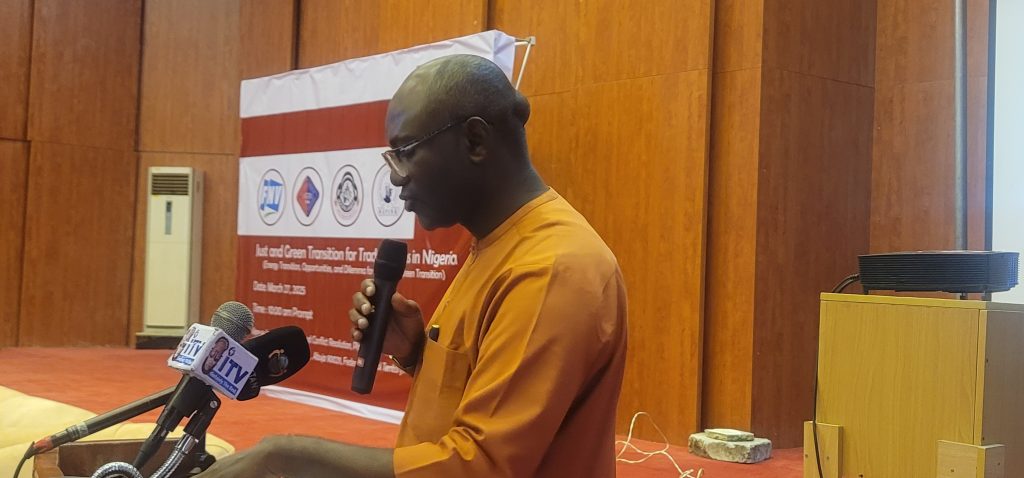Business
Stakeholders Push for Stronger Labor Polices to Protect Jobs in Energy Transition

…Unveil ‘Workers’ Charter of Demand’
By Joel Ajayi
In a bid to strengthen labour laws and safeguard Nigerian workers from job losses amid the country’s transition to a low-carbon economy, stakeholders have called for equitable policies that protect employment and workers’ rights.

The call was made at the public presentation of the Workers’ Charter of Demand and Stakeholders’ Engagement held on Thursday in Abuja.
The event, organized by the Institute for Peace and Conflict Resolution (IPCR) in collaboration with Friedrich-Ebert-Stiftung (FES) Nigeria, also marked the launch of the Justice Department Transition Project, aimed at ensuring a just and sustainable shift to renewable energy.
In his remarks, Lennart Oestergaard, Resident Representative of Friedrich-Ebert-Stiftung FES Nigeria, emphasized the need for stronger collaboration between trade unions, the private sector, and the government to develop policies that protect jobs and equip workers for employment in the renewable energy sector.
“As Nigeria moves towards cleaner energy sources, we must ensure that workers are not displaced or exploited,” he stated. “A just transition means that no one is left behind. This requires deliberate policies that promote job security, social dialogue, and economic fairness.”
Presenting the Workers’ Charter of Demand, Tunde Selman, Researcher and Team Lead at GGT-Nigeria, outlined key labour concerns in Nigeria’s evolving energy landscape.
“The charter is a call to action, advocating for fair labour practices and worker protections,” Selman said.
Some of the key demands highlighted in the charter include: Job Security: Preventing mass redundancies in the energy sector.
Social Protection Measures to Ensuring access to pension schemes and health insurance for workers transitioning from fossil fuel jobs; Fair Wages and Improved Working Conditions to Address labour rights in both traditional and renewable energy sector.
Also, Equipping workers with skills in clean energy technologies, Stronger Labor Union Involvement: Ensuring labor unions play a role in policymaking related to energy transition amongst other.
In her goodwill message, Executive Secretary of the Renewable Energy Association of Nigeria (REAN), Dr. Tosin Akande, thumbed FES and its partners for their advocacy efforts in protecting labor rights during the energy transition.
However, She stressed the need for stronger policies to prevent unemployment and low wages. “Without strong policies, many workers could face job losses or poor working conditions,” Dr. Akande warned.
Meanwhile, the event also featured a panel discussion on “Just and Clean Transition for Trade Unions in Nigeria,” where experts examined challenges and opportunities in the energy transition.
Discussions focused on: Expanding the renewable energy sector while protecting workers’ rights; The role of government and private sector investment in job creation and Vocational training for green economy jobs.
Stakeholders therefore reaffirmed their commitment to advocating for policies that ensure a fair transition for Nigerian workers, ensuring that no one is left behind as the country moves toward a greener future.
Business
FG, Investonaire Academy Unveil National Programme to Equip 100,000 Youths with Financial Skills, Digital Wealth Tools

By Joel Ajayi
The Federal Government, in collaboration with Investonaire Academy, has unveiled a nationwide financial literacy and wealth-building programme targeting more than 100,000 young Nigerians. The initiative is designed to equip participants with practical skills in budgeting, saving, investing, asset building, and long-term financial planning, positioning them for sustainable prosperity in a rapidly evolving economy.
Launched on Tuesday in Abuja, the Honourable Minister of Youth Development, Comrade Ayodele Olawande, described financial literacy as a necessary survival tool for young people confronting today’s economic realities.
He noted that the initiative represents the foundation of a broader vision expected to extend beyond Nigeria to other African nations and global markets.
Reaffirming the Federal Government’s commitment to supporting over 4,000 corps members annually, the Minister said the programme will provide platforms, resources, and skills needed for both job creation and employability.
“The young people who understand money — how to save, invest, build assets, and manage risk — are the ones who will lead Nigeria into prosperity,” he said.
A major highlight of the launch was the expansion of the Nigeria Youth Academy, a digital platform offering mentorship, training, and startup support. According to the Minister, more than 200 startups will receive empowerment through the Academy’s e-app platform before the end of the year.
He stressed the need for deeper collaboration with private organisations, innovators, and youth-focused groups, noting that government alone cannot drive youth development. He further encouraged young Nigerians to embrace skills acquisition, innovation, and digital enterprise, saying these remain critical to reducing the desire for migration and increasing self-reliance.
Outlining the Ministry’s long-term commitments, Olawande emphasized three priorities: supporting youth innovation, equipping them with growth tools, and safeguarding millions of Nigerian youths under the Ministry’s mandate.
Speaking at the launch, Sebastien Sicre, Chief Operating Officer of Investonaire Academy, said the programme was crafted to revolutionize the way Nigerian youths learn and apply financial knowledge. He highlighted the Academy’s gamified Learning Management System (LMS), which offers interactive learning tools, community forums, and real-time mentorship to make financial education engaging and accessible.
Complementing the digital platform is a new 200-square-metre physical training centre in Abuja, opposite the NNPC Towers, where in-person workshops and mentorship sessions will take place.
The curriculum covers key global asset classes — including equities, commodities, forex, and indices — ensuring participants gain a broad understanding of financial markets.
Sicre added that with Federal Government backing, the programme seeks to unlock new opportunities, strengthen youth participation in the digital economy, and reward outstanding participants through a $1 million funding pool to support new and existing ventures.
International Programme Director of Investonaire Academy, Dr. Enefola Odiba, explained that the initiative aims to bridge long-standing gaps in financial education among Nigerian youths. While schools teach many subjects, he said, essential financial skills are often missing.
“Many people can earn money — earning money can be easy. The real challenge is retaining, managing, and growing that money,” he noted.
Referencing the Central Bank of Nigeria’s definition of financial literacy, Odiba stated that implementation remains a major national challenge. He said the initiative brings together government agencies, youth groups, academic institutions, and private-sector partners to translate strategy into measurable impact.
The programme’s curriculum covers budgeting, saving, investing, and financial planning — areas where many young people struggle. By offering practical training, real-world insights, and guided mentorship, the initiative aims to build a generation of financially empowered youth capable of driving innovation, entrepreneurship, and sustainable economic growth.
With this partnership, the Federal Government and Investonaire Academy share a common goal: to empower young Nigerians with the financial intelligence and digital tools needed to build wealth, grow businesses, and transform the nation’s economic future.
-

 Featured6 years ago
Featured6 years agoLampard Names New Chelsea Manager
-

 Featured6 years ago
Featured6 years agoFG To Extends Lockdown In FCT, Lagos Ogun states For 7days
-

 Featured6 years ago
Featured6 years agoChildren Custody: Court Adjourns Mike Ezuruonye, Wife’s Case To April 7
-

 Featured6 years ago
Featured6 years agoNYSC Dismisses Report Of DG’s Plan To Islamize Benue Orientation Camp
-

 Featured4 years ago
Featured4 years agoTransfer Saga: How Mikel Obi Refused to compensate me After I Linked Him Worth $4m Deal In Kuwait SC – Okafor
-
Sports3 years ago
TINUBU LAMBAST DELE MOMODU
-

 News11 months ago
News11 months agoZulu to Super Eagles B team, President Tinubu is happy with you
-
Featured6 years ago
Board urges FG to establish one-stop rehabilitation centres in 6 geopolitical zones
